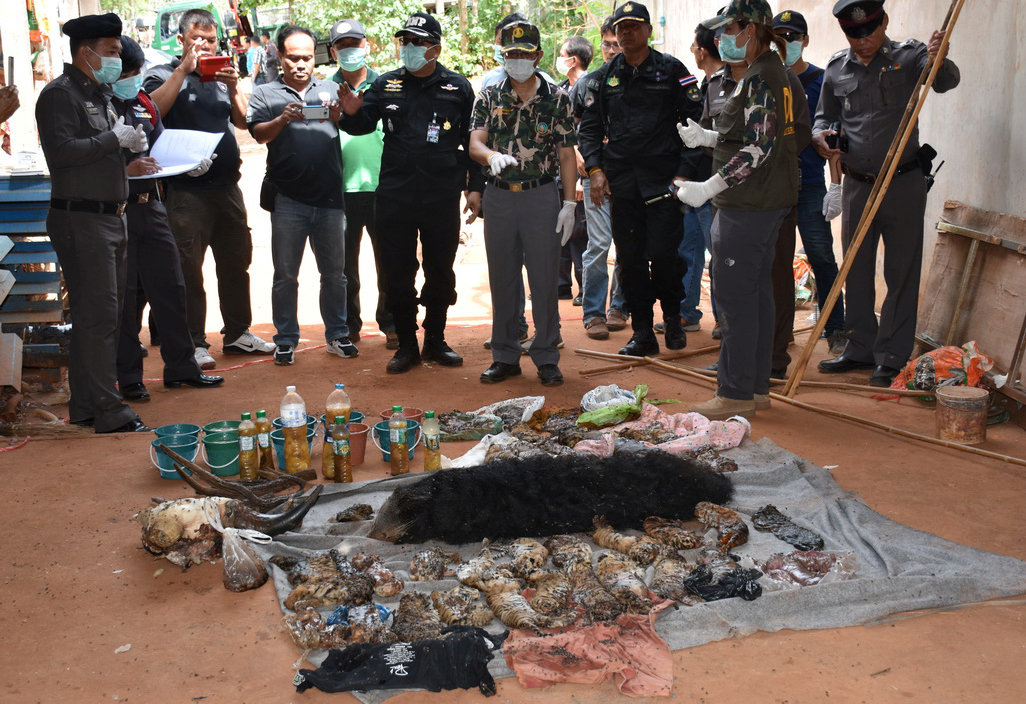40 dead tiger cubs found in freezer of Thailand Tiger Temple amid fears of suspected trafficking
Sign up now: Get ST's newsletters delivered to your inbox

Dead tiger cubs are displayed by Thai officials after they were found during a raid on the controversial Tiger Temple, in Thailand, on June 1, 2016.
PHOTO: REUTERS
Follow topic:
BANGKOK (Reuters/AFP) - Thai wildlife authorities found 40 tiger cub carcasses in a freezer in Thailand's infamous Tiger Temple on Wednesday (June 1) as they removed live animals in response to international pressure over suspected trafficking and abuse.
The 40 dead tiger cubs were found in a freezer in a kitchen area, said Mr Adisorn Nuchdamrong, deputy director-general of the Department of National Parks. "We found 40 tiger cubs today, they were aged about one or two days when they died but we don't quite know yet how long they have been dead," police colonel Bandith Meungsukhum, a local officer, told AFP.
Officials wearing protective masks displayed the bodies of the cubs to media at the temple. Also on display was the body of a Binturong, a protected species commonly known as a bearcat, which the authorities found with the cub carcasses.
"Foreign volunteers at the temple today told us about it and showed us the freezer. Perhaps they felt what the temple is doing isn't right," Mr Adisorn said.
"They must be of some value for the temple to keep them," he added. "But for what is beyond me."
Mr Adisorn said they would file charges against the temple for keeping the carcasses without permission. "A keeper said he was told to place the carcasses when they died in cold storage," he said.
Photographs from the scene on Wednesday showed the cubs laid out on a blanket alongside the body of a bearcat, some deer horns and nearly two dozen containers. Thai newspaper Khaosod, which had a reporter at the scene, said the containers had animal parts and intestines inside them.
Monks at the temple were not immediately available for comment, but the temple has always denied trafficking allegations.
In a statement posted on its Facebook page, the temple said it was common for cubs to be stillborn or die shortly after birth. The temple said it used to cremate dead cubs but the policy was changed in 2010.
"Instead of cremation, the deceased cubs were preserved in jars or kept frozen," the statement added, without elaborating on why the policy was changed.
The temple also denied selling cubs, saying such rumours were from people who have "jumped to conclusions".
Mr Adisorn said the department had not previously known about the cubs. "The temple has notified us when grown tigers die, but never the cubs," he said.
The Buddhist temple in Kanchanaburi province west of Bangkok had become a tourist destination where visitors snapped selfies with bottle-fed cubs.
But the temple has been investigated for suspected links to wildlife trafficking and abuse. A raid that began on Monday is the latest move in a tug-of-war since 2001 to bring the tigers under state control.
Tiger parts are used in traditional Chinese medicine.
Officials have moved 61 live tigers from the temple since Monday, Mr Adisorn said, leaving 76 still there.
Thailand has long been a hub for the illicit trafficking of wildlife and forest products, including ivory. Exotic birds, mammals and reptiles, some of them endangered species, can often be found on sale in markets.
"It's clear that the welfare of the tigers is not a priority and their lives are full of abuse and commercial exploitation for the entertainment of tourists," said Mr Jan Schmidt, Asia-Pacific Wildlife Adviser at World Animal Protection, in a statement.
On Tuesday, the People for the Ethical Treatment of Animals group said the temple was "hell for animals" and called on tourists to stop visiting animal attractions at home and abroad.
Last year one of the temple vets turned whistleblower, handing the authorities three microchips he said were inside a trio of tigers who had disappeared. It has never been fully established what happened to those tigers. Wildlife officials have also discovered during previous raids dozens of hornbills, jackals and Asian bears that were being kept at the sanctuary without permits.
Mr Edwin Wiek, a Thailand-based conservationist who has campaigned for the temple's closure and whose veterinary staff have accompanied wildlife officials this week in the operation to remove the cats, said the cubs might have been kept to make religious charms.
"The key thing is these tigers are illegal under Thai law," he said.
Moves to confront the monks and confiscate the tigers have been staggered over recent months.
For years, the government has been seemingly powerless to resolve the issue, partly for fear of being seen to confront the clergy and also because officials readily admit they have nowhere else to put such a large number of tigers.

